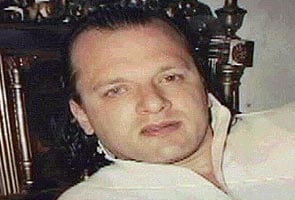
Washington:
The US has launched a review of its agencies' handling of inputs provided by two of the three wives of David Headley about his involvement in the 26/11 strikes, a top Obama administration official today said, even as India expressed disappointment for not being provided specific information on the Mumbai attacks plotter.
"The Director of National Intelligence (Admiral (Retd) James Clapper) has ordered a full review of everything that we knew related to the Headley case," Deputy National Security Advisor for Strategic Communication Ben Rhodes told a group of Washington-based Indian reporters at a special White House briefing on Obama's maiden India trip from November 6 to 9.
"Some of this is vast amount of information within the US intelligence system and the nature of the kind of information that we received in this instance from Headley's ex-wives, which was of a more general nature.
"But we want to find exactly, given the importance of this case... whenever we have that information, whenever the review is completed, we will certainly share that with Indians as well in the spirit of the co-operation and partnership that we have," Rhodes said in response to a question.
However, Rhodes said that with regard to the inputs that have come to light recently, the clear understanding of the Obama Administration is that it shared information that the government had from Headley before 26/11.
"If we had information that could have helped to prevent the attacks and pinpoint specific aspects of the attack, we would have certainly shared that too," Rhodes said.
"The fact of the matter is that the information that we had before 26/11 was not of that nature. It was more just a far more general and less specific. However, after we picked up Headley, we did know a lot about 26/11," he said.
However, in New Delhi, Home Secretary GK Pillai said that Indian agencies were "disappointed" that specific inputs on Headley were not provided by the US, which could have helped it arrest him on his second visit before the attacks.
Rhodes, however, said, "Not only we shared that information, it is signal of strength of our counter-terrorism co-operation, we actually provided access to Headley for the Indian security services so that they were able to ask him questions directly, which continue to flesh out and understanding what took place on 26/11."
"From our standpoint there has always been sharing of information. We share information with India as a partner. Whenever we have something, we think is directly relevant to their security we certainly did so in the sense. It has been even closer in recent years, which is evidenced by the access being provided to Headley for the Indians," Rhodes said.
"The Director of National Intelligence (Admiral (Retd) James Clapper) has ordered a full review of everything that we knew related to the Headley case," Deputy National Security Advisor for Strategic Communication Ben Rhodes told a group of Washington-based Indian reporters at a special White House briefing on Obama's maiden India trip from November 6 to 9.
"Some of this is vast amount of information within the US intelligence system and the nature of the kind of information that we received in this instance from Headley's ex-wives, which was of a more general nature.
"But we want to find exactly, given the importance of this case... whenever we have that information, whenever the review is completed, we will certainly share that with Indians as well in the spirit of the co-operation and partnership that we have," Rhodes said in response to a question.
However, Rhodes said that with regard to the inputs that have come to light recently, the clear understanding of the Obama Administration is that it shared information that the government had from Headley before 26/11.
"If we had information that could have helped to prevent the attacks and pinpoint specific aspects of the attack, we would have certainly shared that too," Rhodes said.
"The fact of the matter is that the information that we had before 26/11 was not of that nature. It was more just a far more general and less specific. However, after we picked up Headley, we did know a lot about 26/11," he said.
However, in New Delhi, Home Secretary GK Pillai said that Indian agencies were "disappointed" that specific inputs on Headley were not provided by the US, which could have helped it arrest him on his second visit before the attacks.
Rhodes, however, said, "Not only we shared that information, it is signal of strength of our counter-terrorism co-operation, we actually provided access to Headley for the Indian security services so that they were able to ask him questions directly, which continue to flesh out and understanding what took place on 26/11."
"From our standpoint there has always been sharing of information. We share information with India as a partner. Whenever we have something, we think is directly relevant to their security we certainly did so in the sense. It has been even closer in recent years, which is evidenced by the access being provided to Headley for the Indians," Rhodes said.
Track Latest News Live on NDTV.com and get news updates from India and around the world

